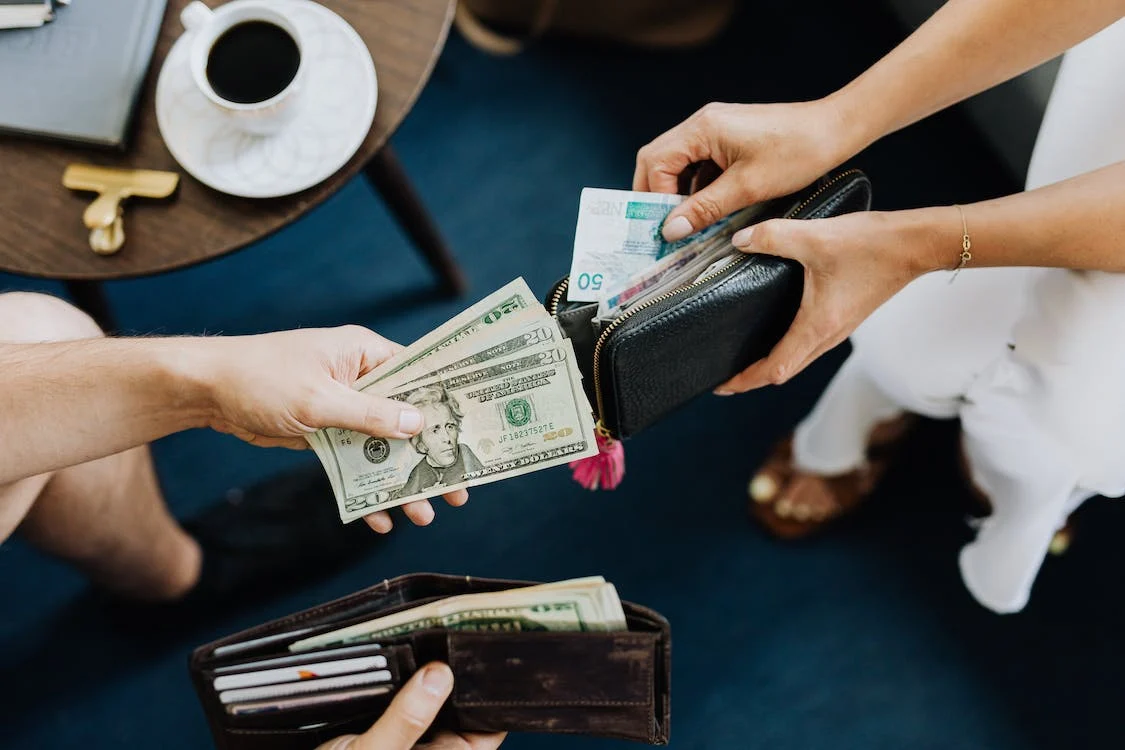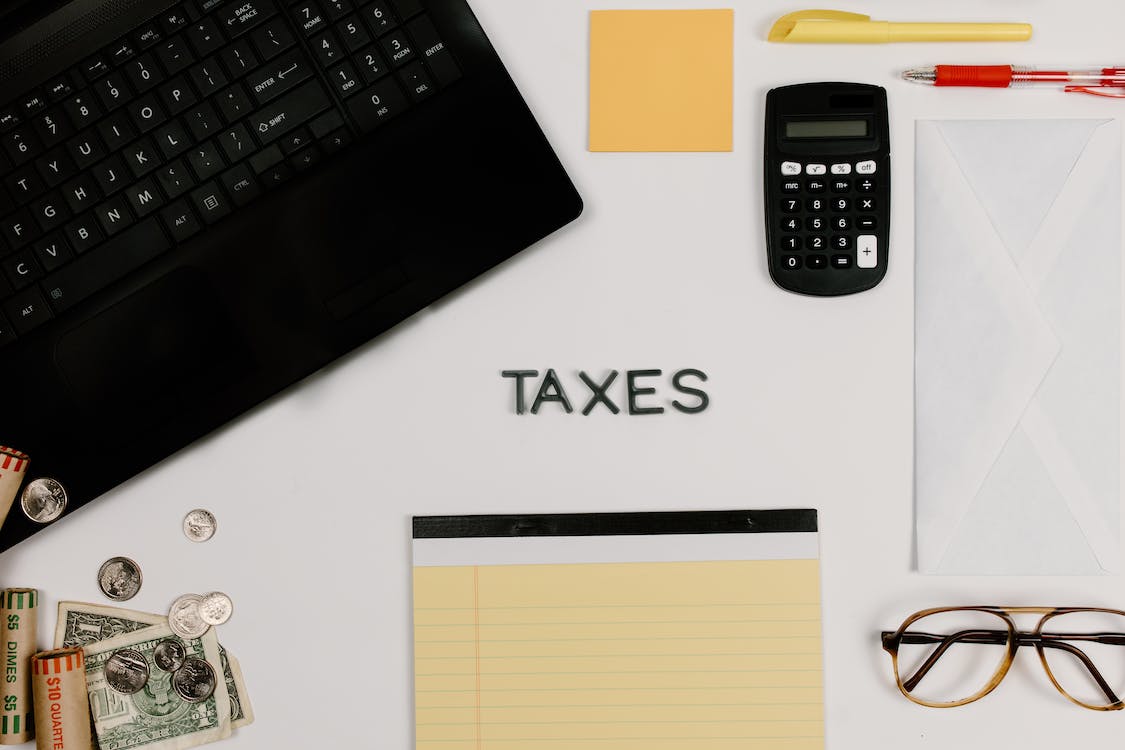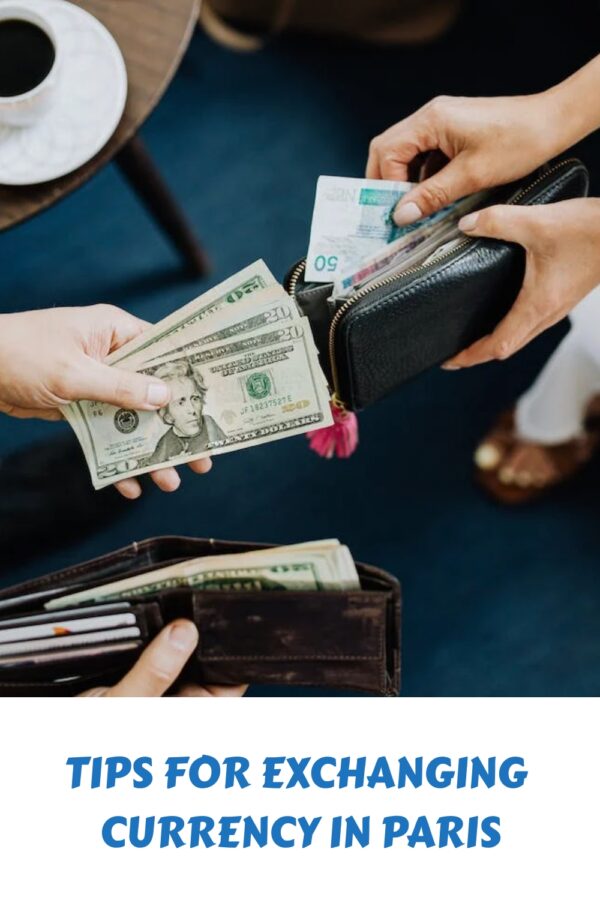Experiencing the tantalizing flavors of a patisserie, immersing in the rich aura of the Louvre, or indulging in couture shopping at Champs-Elysées – Parisian dreams are woven with golden threads of memories. But, it’s essential to ensure the seamless flow of your adventures, and an important element is understanding currency exchange.
In this blog post, we’ll demystify the subject of “Currency Exchange in Paris: Tips and Best Rates for Travelers”. We’ll guide you through exchanging your home currency confidently, ensuring the only surprises on your charming Parisian getaway are delightful ones!
The currency used in Paris, as well as throughout France, is the euro (€). Exchanging money between currencies can be done at banks, currency exchange bureaus near tourist areas, train stations, and airports. Additionally, ATMs are widely available and accept major credit and debit cards for convenient currency withdrawal. It’s advisable to use a debit card to withdraw cash, instead of a credit card to minimize fees.
Table of Contents
Currency in Paris: From Euros to Banknotes

When traveling to Paris, it’s essential to familiarize yourself with the local currency—euros. France adopted the euro as its national currency, replacing the French franc in 2002. The euro symbol is represented by “€,” divided into 100 cents. This ensures that transactions can be conveniently made in convert euros to smaller denominations.
Carrying euros during your stay in Paris provides several advantages. Firstly, it eliminates the need for currency conversion fees or potential fluctuation risks of exchanging money multiple times. Secondly, it allows you to seamlessly navigate everyday transactions such as dining out, shopping, and transportation without worrying about finding suitable currency exchange services.
Furthermore, France has a range of banknotes and coins circulated among businesses and residents alike. Familiarizing yourself with these denominations will help you navigate monetary transactions effortlessly in Paris.
See Related: Best Travel Tips for Paris: A Guide for a Memorable Trip
Accepted Banknotes and Coins in Paris

In Paris, you’ll encounter various banknotes and coins widely accepted for payment. The seven banknotes currently in circulation are €5, €10, €20, €50, €100, €200 (rare), and €500 (rare). Each denomination carries distinct design features and security elements to prevent counterfeiting while providing an aesthetically pleasing experience.
Imagine walking into a charming café by the Seine River and paying for your hot cup of coffee using a crisp €5 note. Alternatively, if you plan to indulge in some retail therapy along Champs-Élysées, your larger purchases may require using higher-value banknotes like the €50 or even €100 notes.
Paris also utilizes eight coins for smaller transactions. These include the denominations of €1 and €2 as well as one cent through one dollar and 50 cents. Having these coins on hand proves useful when you want to make quick purchases or access certain services that only accept cash.
By understanding the banknotes and coins accepted in Paris, you can ensure a smooth transaction experience as you explore all the city has to offer. However, it’s important to know that while carrying cash is necessary in some instances, convenient alternatives are available for making payments.
Using Cards for Payments in Paris

Regarding payment methods in Paris, using cards is the most convenient and widely accepted option. Visa and Mastercard are generally accepted at most establishments, making it easy to make payments without the hassle of carrying large amounts of cash. American Express cards are also accepted but to a lesser extent, so having an alternative card on hand is advisable.
Using cards offers several advantages for travelers. Firstly, it eliminates the need to exchange currency or carry large sums of cash, which can be risky and inconvenient. Secondly, it provides a record of transactions that can be helpful for budgeting and tracking expenses during your trip.
Imagine strolling through the charming streets of Paris, exploring local shops, and indulging in French cuisine without worrying about constantly withdrawing money from ATMs or finding currency exchange services.
With a card, you can seamlessly pay at restaurants, boutiques french banks, and tourist attractions easily and confidently.
However, there are a few things to consider when using cards in Paris. Transaction fees may apply depending on your bank or credit union or card provider. It’s recommended to check with your financial institution beforehand to understand any potential fees associated with international transactions.
Additionally, while cards are widely accepted, carrying some cash for small establishments or areas where card payments might not be feasible is always a good idea.
See Related: Fun & Free Things To Do in Paris
Credit vs Debit: Which To Use?

One common dilemma many travelers face is whether to use their credit or debit cards while traveling abroad. Each option has its advantages and considerations.
Credit cards offer convenience and security. They often come with perks such as travel insurance or purchase protection, which can be beneficial when traveling. In case of fraudulent activity on your card, credit cards usually provide better protection against unauthorized charges. Additionally, some credit cards offer rewards programs that allow you to earn points or miles that can be redeemed for future travel or other benefits.
On the other hand, using a debit card can help you stay within budget and avoid accumulating debt. With a debit card, you are essentially spending money that you already have in your bank account. This can be helpful for budget-conscious travelers who want to track their expenses and avoid overspending.
Personal anecdote: During my trip to Paris, I preferred using my debit card to keep track of my expenses and make sure I didn’t go over my budget. It helped me stay disciplined while still enjoying the vibrant culture and attractions of the city.
It’s important to note that regardless of whether you choose to use a credit card or debit card, it’s recommended to inform your bank about your travel plans before your trip. This helps prevent any potential issues with overseas transactions being flagged as suspicious activity.
While both credit and debit cards have their advantages, the decision ultimately depends on your personal preferences and financial situation. Consider factors such as rewards, fees, and budgeting needs before making a decision on prepaid cards.
See Related: Best Paris Tour Packages: Tips to Book the Perfect Vacation

When traveling to Paris, it’s essential to have a basic understanding of how cash exchange works to ensure a smooth and cost-effective experience. While most establishments in the city accept credit cards, it’s always wise to carry some cash for smaller transactions or in case of any unforeseen circumstances.
To begin with, one can exchange currency at various places in Paris, such as banks, currency exchange offices, or even at some hotels. However, it’s vital to be aware that each option may come with its pros and cons. For instance, while banks generally offer secure and reliable currency converter services, they may also have limited hours and charge higher fees. On the other hand, other currency and exchange offices tend to have more flexible hours and competitive rates but might require careful scrutiny to ensure legitimacy.
A popular choice currency exchange office among travelers is Change Elysées 66, a renowned currency exchange business located centrally in Paris. With their professional atmosphere and convenient location, Change Elysées 66 provides a reliable and convenient option for exchanging currency without charging a percentage fee. This can be particularly advantageous when exchanging larger sums of money or if you plan on making multiple transactions during your stay.
When considering where to exchange your cash, shopping around for the best rates is crucial. Currency exchange rates can vary significantly between different establishments. To find the most favorable deals, compare rates offered by multiple banks or exchange offices.
Taking the time to research and compare rates beforehand could potentially save you a significant amount of money during your trip.
Additionally, watch for hidden fees or commissions that may be added on top of the exchange rate. Some places may boast attractive rates to exchange dollars but then charge additional fees that substantially diminish the value of your exchanged currency. Therefore, always inquire about any potential fees before finalizing the transaction.
Navigating cash exchange in Paris requires careful consideration and research. By understanding the various options available and comparing rates and fees, you can ensure a favorable money exchange experience that maximizes the value of your money.
Now that we’ve explored some tips on navigating cash exchange in Paris let’s find the best rates and where to find them.
- The European Central Bank reports that as of 2023, there are approximately 23 billion Euro banknotes in circulation worldwide, with the €50 note being the most widely circulated.
- According to a European Parliament report in 2020, the Euro (€) is the second most traded currency globally, making up approximately 32% of daily foreign exchange market turnover.
- France’s central bank, Banque de France, indicates that by end of February 2023 around 70% of transactions in France were still carried out in cash despite a steady increase in electronic payments over the years.
See Related: Paris Packing List: What to Bring for a Perfect Trip
Best Rates and Where to Find Them

As a savvy traveler, finding the best currency exchange rates is undoubtedly a priority. While it’s impossible to predict fluctuations in euro exchange rate rates accurately, there are strategies you can employ to increase your chances of obtaining more favorable rates during your time in Paris.
One reliable approach is to keep track of currency exchange rates before you travel. Stay informed about the most current exchange rate trends and fluctuations by utilizing online tools or consulting with financial institutions. This knowledge will provide you with a benchmark for assessing whether the rates offered at banks or exchange offices are competitive and worth considering.
Another valuable resource for obtaining the best rates is comparison websites. Numerous platforms allow you to compare rates offered by various banks and currency exchange offices in Paris. These websites provide real-time information, making it easier to decide where to exchange your money.
It’s important to note that airports may be convenient places for currency exchange, but they typically offer less favorable rates for changing money over than those in the city. Therefore, it’s advisable to avoid exchanging large sums of money at airports if possible.
Lastly, as mentioned earlier, Change Elysées 66 has been consistently recommended for offering competitive rates without charging additional fees. Their central location ensures accessibility, along with their reputation for providing professional services.
By using more money and utilizing these strategies and resources, you can enhance your chances of finding the best currency exchange rates during your trip to Paris.
See Related: Fun & Interesting Facts About Paris
Understanding VAT Refunds for Non-EU Residents

For travelers visiting Paris from outside the European Union (EU), understanding VAT refunds can be a valuable way to save money on qualified purchases. VAT, or Value Added Tax, is a consumption tax that is included in the prices of goods and services throughout France. However, non-EU residents have the opportunity to claim a refund on this tax when they meet certain criteria.
To qualify for a VAT refund, non-EU residents must spend at least €175 at a participating store on the same day. It’s important to note that not all stores participate in the VAT refund program, so it’s essential to look for signage indicating their involvement. Once you’ve made your qualifying purchase, be sure to ask for a Retail Export Form (bordereau de détaxe) from the store.
When completing the Retail Export Form, you’ll need to provide your passport details, information about your place of residence outside of the EU, and your contact information. This form indicates that you are an eligible non-EU resident seeking a VAT refund.
After shopping in Paris, head to the airport or international train station customs office before departing the EU. Ensure you have all your purchased items as customs officials may request to inspect them. Present your Retail Export Form along with your receipts and must obtain an official export validation stamp on the form.
Once you have received the export validation stamp, you have two options for obtaining your VAT refund. Some airports and train stations have duty-free shops where you can receive an immediate refund in cash or credit it to your credit card.
Alternatively, you may mail the stamped Retail Export Form back to the store where you made your purchases. In this case, the store will process your refund and send it via mail or bank transfer.
It’s important to know that some procedures and fees are associated with VAT refunds. To start, a minimum purchase amount is required to qualify for the refund. Additionally, stores typically charge a small commission fee based on the total VAT being refunded to you. Finally, non-EU residents must be aware that they must follow the specific guidelines and deadlines provided by the store or refund service to ensure a smooth process.
Understanding VAT refunds for non-EU residents can offer significant savings when visiting Paris. You can make the most of this opportunity by familiarizing yourself with the qualification criteria, completing the necessary paperwork, and choosing the most convenient means of obtaining your refund. Remember to plan ahead and allocate enough time for the VAT refund process before your departure from Paris.
Related Resources:
- The Ultimate Guide to Planning a Trip to Paris
- One-Day in Paris Itinerary: How to Spend a Day
- The Best Things to Buy in Paris: A Complete Guide

